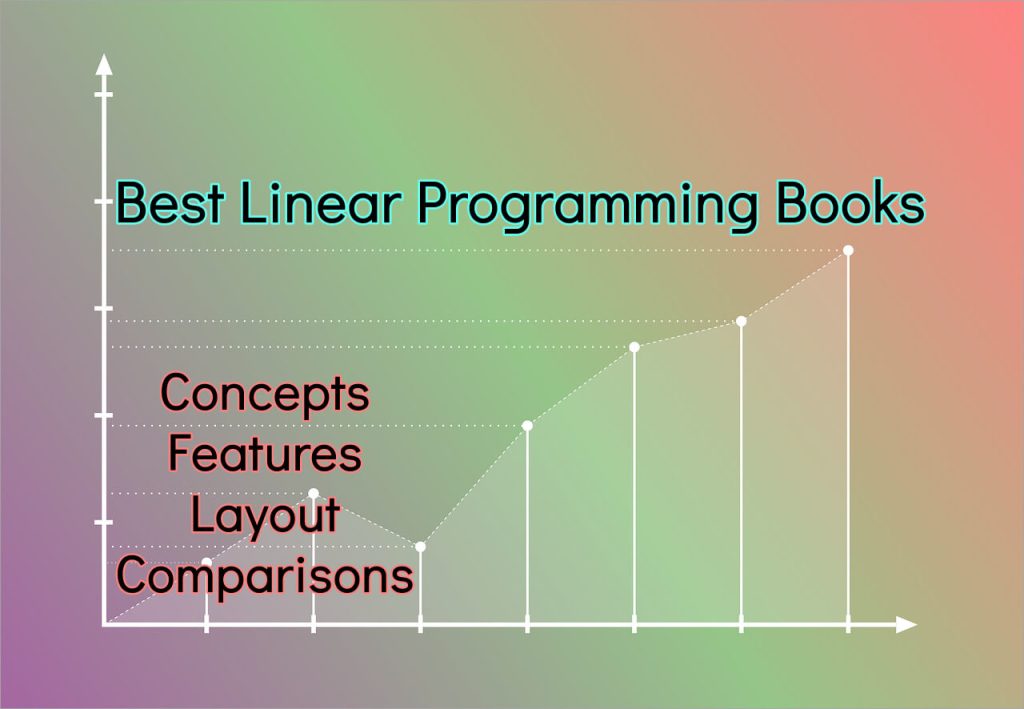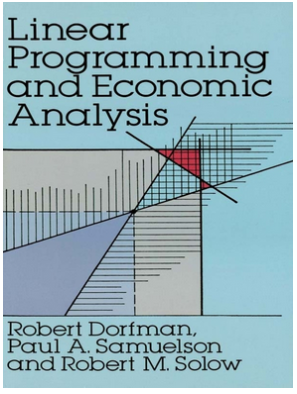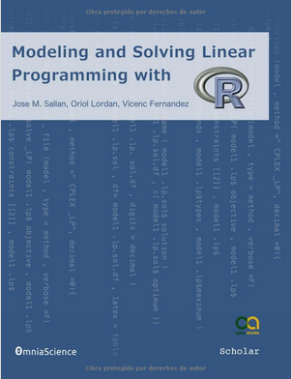Table of Contents
Today we’re looking at the best linear programming books of this year.
What is linear programming?
Linear programming is the process of achieving the best outcome in a mathematical model.
Its requirements are represented by linear relationships.
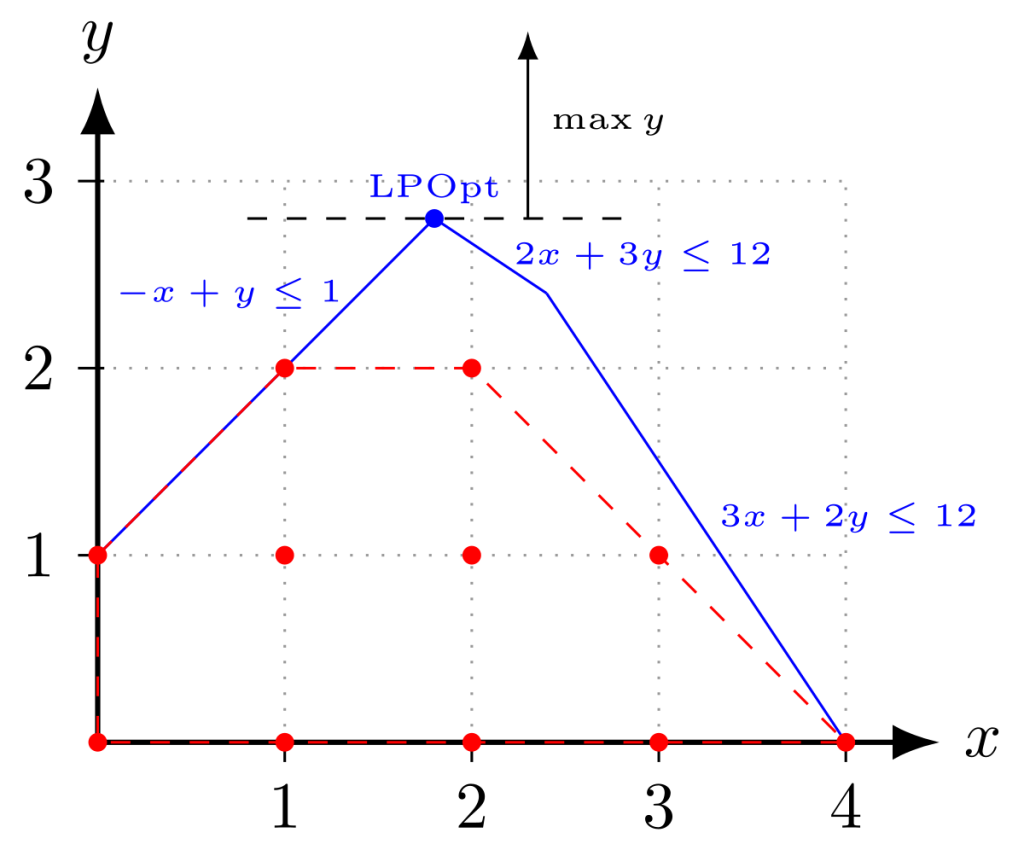
Linear programming algorithms find a point where the function has the largest or smallest value.
The three components of linear programming: decision variables, objective function and constraints.
Because many technological professions use linear programming, Computer Science majors frequently include linear programming courses in their curriculum.
Who uses linear programming?
Linear programming is used by a variety of professionals in fields such as:
✅ mathematics
✅ business
✅ economics
✅ engineering
Industries using linear programming include transportation, energy, manufacturing and beyond.
This post contains affiliate links. We may receive compensation if you buy something. Read our disclosure for more details.
TLDR: Best Linear Programming Books
🔥 Best Overall 🔥
Introduction to Linear Optimization
💥 Best for Newbies 💥
Linear Programming and Economic Analysis
💸 Best Value 💸
Modeling and Solving Linear Programming with R
Best Linear Programming Books
Now let’s take a look at some of the best linear programming books for this year.
You’ll discover their:
- features
- core concepts
- layout
- comparisons
And more.
1. Introduction to Linear Optimization
↘️ Ideal for: linear programming newbies
↘️ Topics covered: foundations, theory, avoiding common problems
Introduction to Linear Optimization is the granddaddy of all linear optimizations books.
- Learn the foundations of linear programming
- Explore theory
- Discover how to avoid problems
➡️ In our opinion, Introduction to Linear Optimization is one of the best linear programming books overall.
MIT professors Dimitris Bertsimas and John N. Tsitsiklis start you off with thorough coverage of the foundations of linear programming.
Then, you’ll move onto:
✅ theory
✅ algorithms
✅ network flows
✅ interior point methods
And beyond.
After that, you’ll learn simple yet effective rules to avoid commonly found linear programming problems.
… the foundations of linear programming are presented in a clear yet relatively rigorous fashion, accompanied by numerous intuitive geometrical explanations of the abstract general concepts…
– Jonathon Birge
2. Linear Programming and Economic Analysis
↘️ Ideal for: linear programming newbies, economists, mathematical novices
↘️ Topics covered: basic concepts, nonlinear programming, game theory
Introduction to Linear Optimization is pretty similar to Linear Programming and Economic Analysis.
But this book is a little better for beginners.
- Explore basic concepts in linear programming
- Dive into nonlinear programming
- Touch on the basics of game theory
➡️ We think Linear Programming and Economic Analysis is one of the best linear programming books for beginners.
You’ll start by exploring the basic concepts of linear programming.
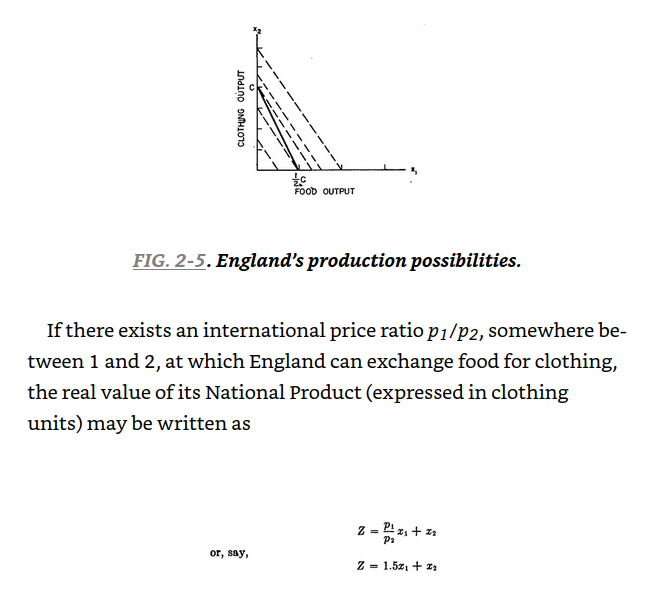
Then you’ll touch on the algebra of linear programming.
After working on various problems, you’ll get into some nonlinear programming.
Finally, you’ll discover the connection between linear programming and game theory.
… if you’re an economist… that wants to learn about linear programming, then this book is definitely for you…
– A MATH NERD
3. Modeling and Solving Linear Programming with R
↘️ Ideal for: linear programming newbies
↘️ Topics covered: solving linear programming in R
Modeling and Solving Linear Programming with R is different than Introduction to Linear Optimization and Linear Programming and Economic Analysis.
That’s because you’ll be using R programming to model and solve linear programming problems.
Plus it’s a little easier on the wallet.
- Get an introduction to linear programming
- Learn applications of linear programming
- Solve linear programming in R
➡️ Modeling and Solving Linear Programming with R is possibly one of the best linear programming books for developers on a budget.
You’ll start by learning the history of linear programming.
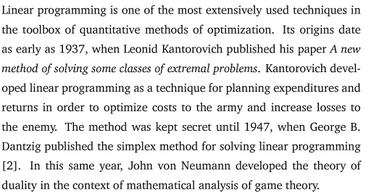
Then you’ll learn the basics of linear programming.
You’ll also find a series of exercises showing you some linear programming applications.
Finally, you’ll learn how to solve linear programming using the R programming language.
For every problem presented, you’ll find a solution with R code alongside its numerical solution.
4. Linear Programming and Network Flows
↘️ Ideal for: linear programming newbies
↘️ Topics covered: cycling, implementation strategies, network flows
Unlike the other books on our list, Linear Programming and Network Flows touts itself as “the authoritative guide to modeling and solving complex problems with linear programming.”
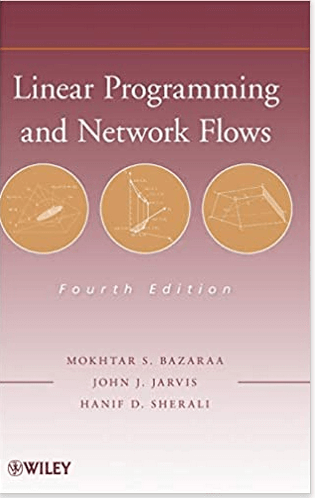
➡️ Linear Programming and Network Flows is possibly one of the best linear programming books of all time.
In this comprehensive guide, you’ll start with linear algebra and convex analysis.
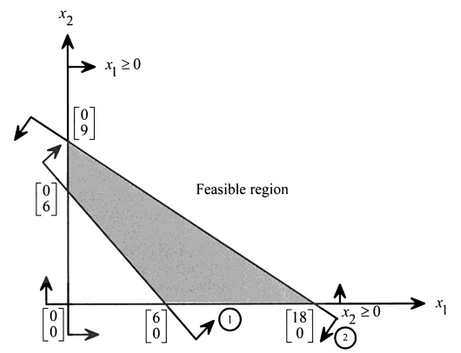
With ample exercises, you’ll dive into:
✅ cycling in the simplex method
✅ sensitivity and parametric analysis
And much, much more.
5. Understanding and Using Linear Programming
↘️ Ideal for: linear programming newbies, computer science and mathematics students
↘️ Topics covered: practice, theory and applications of linear programming
Like Linear Programming and Network Flows, you’ll learn the fundamentals of linear programming.
But you won’t get into network flows in this book.
You only need to know basic linear algebra before digging in.
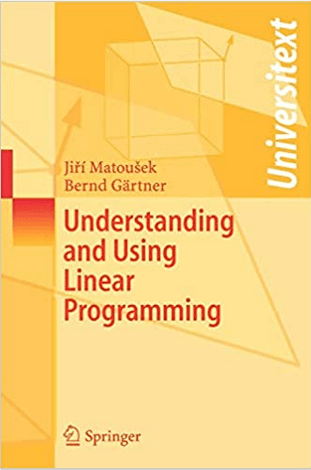
➡️ Understanding and Using Linear Programming is perhaps one of the best linear programming books for learning theory.
In this introductory textbook, you’ll focus on applications of linear programming.
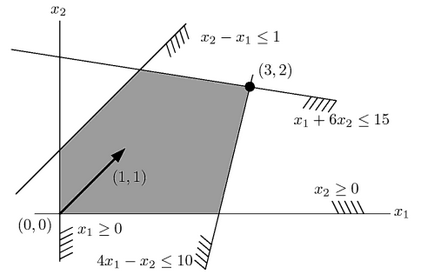
Going behind the scenes, you’ll dive deep into practice and theory.
While succinct, you’ll still find sufficient detail covering proofs.
6. Linear Programming: Methods and Applications
↘️ Ideal for: linear programming newbies, research analysts, applied mathematicians, economists, statisticians
↘️ Topics covered: methods and applications of linear programming
Linear Programming Methods and Applications is by author Dr. Saul I. Gass.
Like Understanding and Using Linear Programming, you’ll learn the basics of linear programming.
But here you’ll focus more on methods than theory.
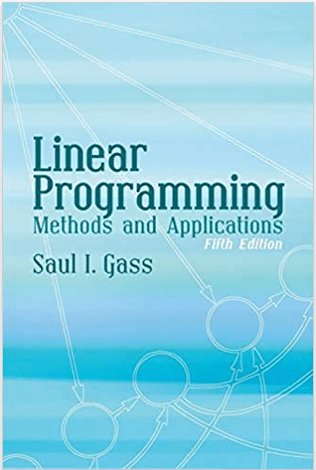
➡️ Linear Programming: Methods and Applications is considered “one of the best introductory books on linear programming” by the the Journal of the American Statistical Association.
Covering a spectrum of linear programming techniques, you’ll learn various concepts:
✅ applied
✅ theoretical
✅ computational
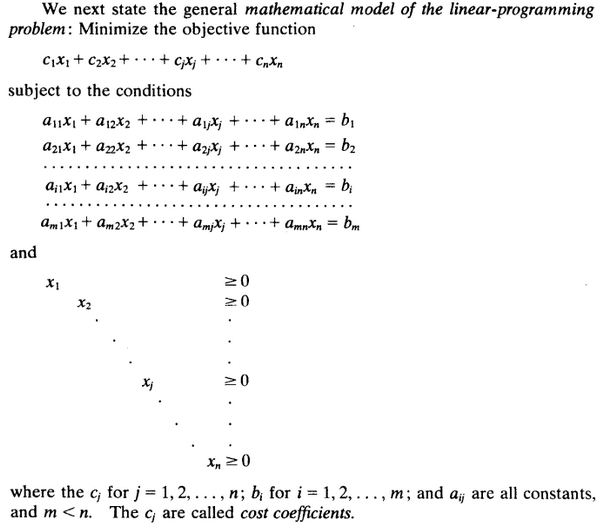
There are plenty of exercises and examples to illustrate concepts.
You’ll also get a little bit into nonlinear programming.
7. An Introduction to Linear Programming and Game Theory
↘️ Ideal for: linear programming newbies
↘️ Topics covered: linear programming, game theory
This book is similar to Linear Programming: Methods and Applications.
But here, you’ll also learn about game theory.
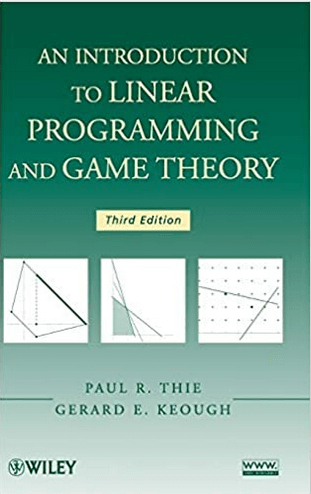
➡️ In our opinion, An Introduction to Linear Programming and Game Theory is one of the best linear programming books for exploring game theory.
You’ll start with an introduction to theoretical concepts and computational techniques.
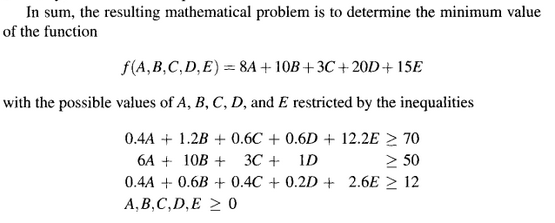
You’ll also examine:
✅ sensitivity analysis for the two-variable problem
✅ integer programming examples
✅ nonlinear programming
✅ make vs buy models
And beyond.
There are plenty of modeling exercises and integer programming examples to illustrate real-world uses of linear programming.
8. Linear Programming: An Introduction to Finite Improvement Algorithms
↘️ Ideal for: linear programming newbies, mathematicians, operations research and engineering students
↘️ Topics covered: mathematical proof techniques, computational methods
This book is similar to Understanding and Using Linear Programming.
But it’s not quite as expensive.
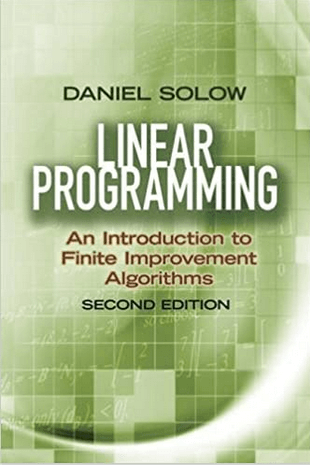
➡️ We believe Linear Programming: An Introduction to Finite Improvement Algorithms is one of the best linear programming books for exploring mathematical proof techniques.
In addition, you’ll tackle:
✅ geometric motivation
✅ linear algebra
✅ computational implementation
✅ parametric analysis
And much, much more.
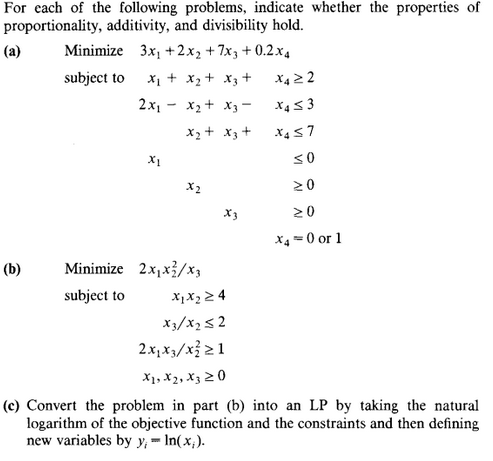
9. Linear Programming and Resource Allocation Modeling
↘️ Ideal for: linear programming newbies, economics majors
↘️ Topics covered: linear programming, resource allocation modeling
This book is somewhat similar to Linear Programming: An Introduction to Finite Improvement Algorithms.
But here, you’ll also learn about resource allocation modeling (RAM).
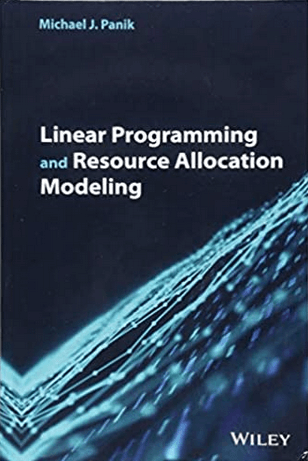
➡️ We believe Linear Programming and Resource Allocation Modeling is one of the best linear programming books for learning about RAM.
In addition, you’ll learn about the foundations of data envelopment analysis (DEA).
Simply put, that’s the process of evaluating the relative efficiency of decision-making units.
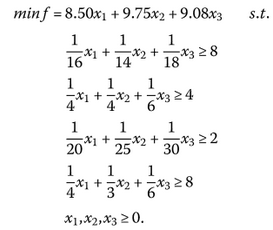
You’ll also cover:
✅ primal and dual problems
✅ canonical and standard forms of linear programming
✅ computational aspects of linear programming
✅ sensitivity analysis
✅ parametric programming
And beyond.
10. Linear and Nonlinear Programming
↘️ Ideal for: linear programming newbies
↘️ Topics covered: linear programming, nonlinear programming
This book dedicates a little more time to nonlinear programming than other books on our list.
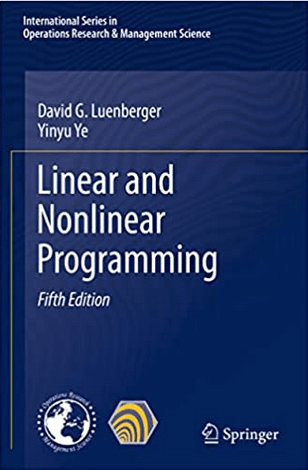
➡️ Linear and Nonlinear Programming is perhaps one of the best linear programming books to explore nonlinear programming.
You’ll learn practical optimization techniques while exploring algorithmic behavior.

The book is separated into three parts:
1️⃣ introduction to linear programming
2️⃣ theory of unconstrained optimization
3️⃣ constrained optimization problems
Throughout the book, you’ll explore data science and machine learning concepts like:
✅ convergence speed analysis
✅ stochastic gradient method
✅ duality theories
And more.
11. An Illustrated Guide to Linear Programming
↘️ Ideal for: linear programming newbies
↘️ Topics covered: basics, problems, solution techniques
Like Linear Programming: Methods and Applications, this book is written by Saul. I Gass.
But it’s more visually stimulating than any other book on our list.
In addition, you don’t need to know any math beyond high school algebra.
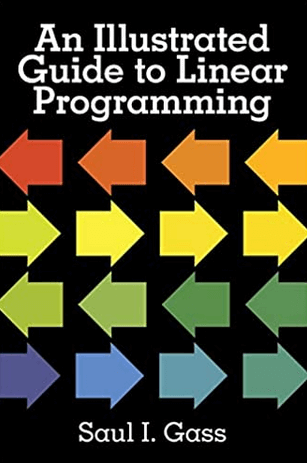
➡️ An Illustrated Guide to Linear Programming is arguably one of the best linear programming books for visual learners.
It often uses humor to introduce otherwise challenging concepts.
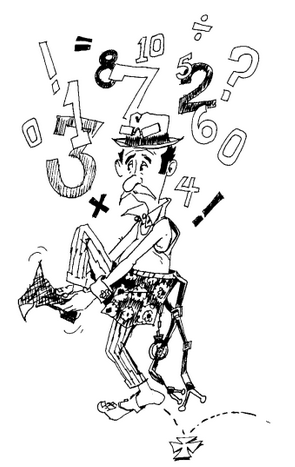
You’ll start by learning about basic linear programming concepts.
Then you’ll move onto:
✅ formulating problems
✅ solution techniques
✅ network problems
✅ game theory
And beyond.
12. Linear Programming: An Introduction With Applications
↘️ Ideal for: linear programming newbies
↘️ Topics covered: foundations, proofs, game theory
Like An Illustrated Guide to Linear Programming, you don’t need to know any math beyond high school algebra.
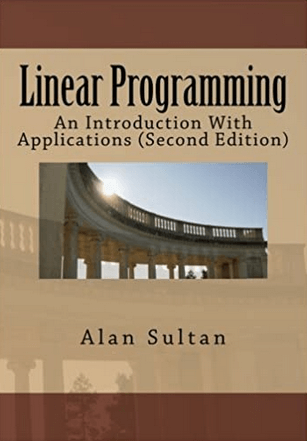
➡️ Linear Programming: An Introduction With Applications may be one of the best linear programming books for students with limited math skills.
You’ll start by learning the foundations of linear programming.
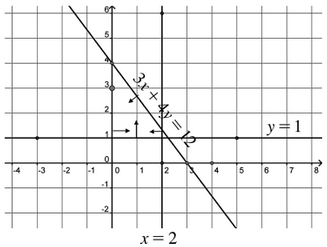
Then you’ll explore formal and informal proofs.
Finally, you’ll explore related areas such as:
✅ dynamic programming
✅ integer programming
✅ goal programming
✅ network analysis
✅ game theory
And more.
Best Linear Programming Books: Conclusion
Today we looked at the best linear programming books including:
🔥 Best Overall 🔥
Introduction to Linear Optimization
💥 Best for Newbies 💥
Linear Programming and Economic Analysis
💸 Best Value 💸
Modeling and Solving Linear Programming with R
So whether you’re just getting started or want to dive deep into linear programming concepts, we think these books have you covered.
Readers of Best Linear Programming Books are also reading:
- 18 Best R Programming Books
- Best Way to Learn Algorithms
- 23 LeetCode Alternatives You Need
- 13 Best Data Visualization Books
- Best Book for Google Interview Preparation
What is linear programming?
Linear programming is the process of achieving the best outcome in a mathematical model. Its requirements are represented by linear relationships. Linear programming algorithms find a point where the function has the largest or smallest value. The three components of linear programming: decision variables, objective function and constraints. Because many technological professions use linear programming, Computer Science majors frequently include linear programming courses in their curriculum. Learn more about linear programming in today’s post where we’re looking at some of the best linear programming books of this year.
Who uses linear programming?
Linear programming is used by a variety of professionals in fields such as mathematics, business, economics and engineering. Industries using linear programming include transportation, energy, manufacturing and beyond. Learn more about linear programming in today’s article.
What are the best linear programming books?
In our opinion, some of the best linear programming books include our favorite overall, Introduction to Linear Optimization. For newbies, we like Linear Programming and Economic Analysis. And for best value, we like Modeling and Solving Linear Programming with R. Learn more about these best linear programming books in today’s post.
Is the book Introduction to Linear Optimization worth it?
Yes, we think Introduction to Linear Optimization is worth it. In our opinion, it’s one of the best linear programming books overall. MIT professors Dimitris Bertsimas and John N. Tsitsiklis start you off with thorough coverage of the foundations of linear programming. Then you’ll move onto theory, algorithms, network flows, interior point methods and beyond. After that you’ll learn simple yet effective rules to avoid commonly found linear programming problems. Learn more about Introduction to Linear Optimization in today’s post.
